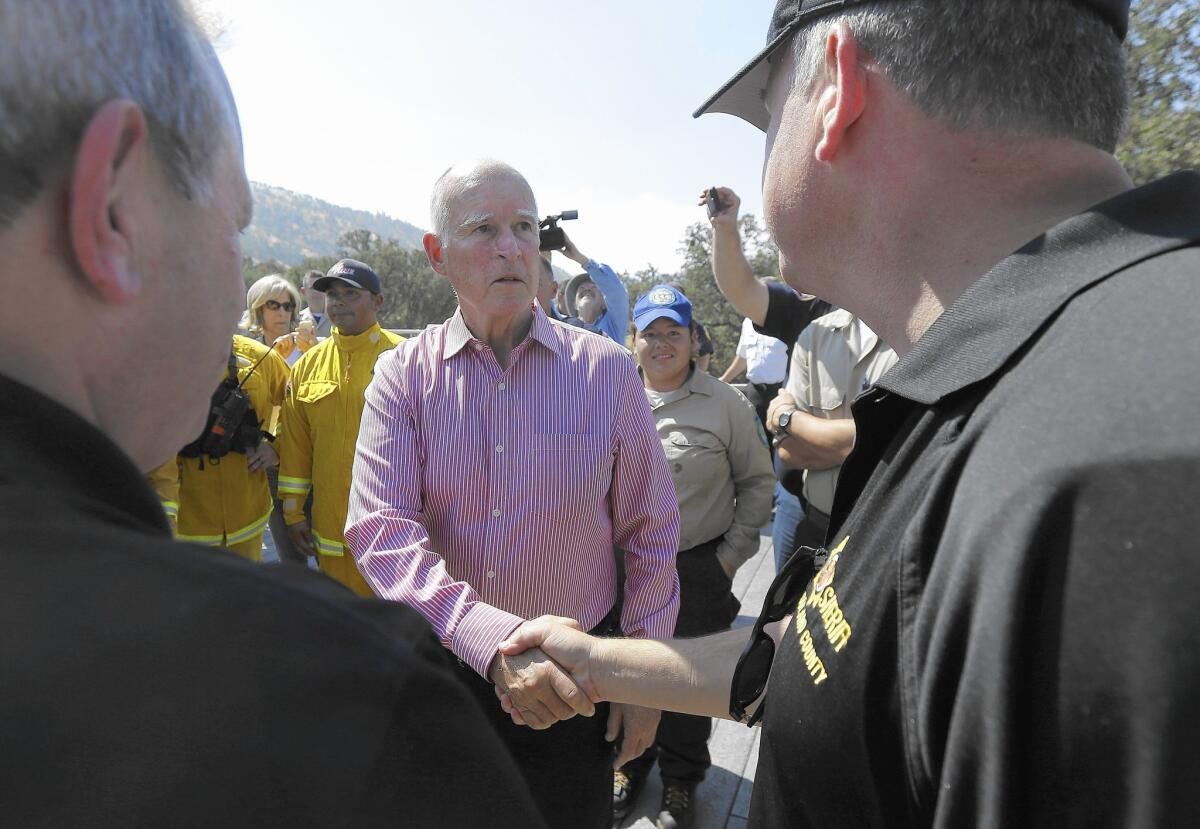Gov. Brown highlights climate change risks at site of Rocky fire

- Share via
Reporting from COWBOY CAMP TRAILHEAD, Calif. — In his quest to force tougher action on climate change, Gov. Jerry Brown has traveled to China, Mexico, Canada, even the Vatican.
But he was much closer to home on Thursday, just a couple dozen miles from the ranch his family has owned for generations.
Standing in front of scorched hills, the smell of smoke lingering in the air, Brown said the wildfire that had ripped through the area was evidence that global warming already has created dangerous conditions in California.
“This is a real wake-up call,” the governor said. “It’s a new normal.”
With the state enduring rising temperatures and its fourth year of drought, more devastating fires could be around the corner, Brown said. “If the drought was to continue for a year or several years, California could literally burn up,” he warned.
The blaze known as the Rocky fire began more than a week ago near Clear Lake, so far tearing through 69,600 acres in three counties. Firefighters have been making progress in recent days, but 43 homes and 53 other buildings have been destroyed, according to the California Department of Forestry and Fire Protection.
The Rocky fire is the largest of 19 wildfires burning across the state, and it’s been one of the most challenging. It grew rapidly and evaded firefighters’ attempts at containment — at one point jumping a highway and threatening more homes.
Brown visited the area Thursday to meet with first responders and residents who had lost their homes.
“These are very difficult times and a real tragedy for the families,” he said, adding that he would find ways to aid the victims. “I’ve been through a lot of these fires and emergencies. And often, after a few weeks, there’s a lot of discontent. So I’m going to be on this very carefully to see what’s available.”
The governor’s appearance also was a chance for him to emphasize the dangers of global warming.
“We have a real challenge in California,” Brown said. “Unlike the East, where climate change seems to be adding more storms, here in California and the Southwest it’s more dryness.
“We’ve got more dryness, less moisture and more devastating fires. So more to come. It is very serious.”
The governor repeated his challenge to Republican presidential candidates — many of whom have denied the science of climate change or opposed steps to combat it — to outline action plans.
“California is burning,” he said. “What the hell are you going to do about it?”
Climate scientists said it is difficult to draw a connection between a specific fire and global warming, but asserted an increased risk of major conflagrations is undeniable.
“We know there are multiple factors required to get wildfire,” said Noah Diffenbaugh, a professor at Stanford University. “We also know that some of those factors have been made more severe by global warming.”
Alex Hall, a professor at UCLA, said rising temperatures have dried out the state in a dangerous way.
“We probably already are seeing evidence of a changed world,” he said.
Brown thanked firefighters who traveled to Northern California from all over the state to help battle the flames. More than 3,600 converged on the Rocky fire, which burned in Colusa, Lake and Yolo counties.
“Everyone is pitching in here,” Brown said. “It’s just a wonderful thing when people pull together.”
But an explosive beginning to California’s traditional fire season already has taxed firefighters.
One team from Sacramento said they had fought fires in the Sierra foothills and near Napa Valley before moving on to the Rocky fire.
Dave Durham, a captain, said the Rocky fire was the most difficult one they’d encountered so far.
“Its growth and its spread has definitely been more severe,” he said.
[email protected]
Twitter: @ChrisMegerian
Times staff writer Veronica Rocha contributed to this report.
More to Read
Sign up for Essential California
The most important California stories and recommendations in your inbox every morning.
You may occasionally receive promotional content from the Los Angeles Times.









